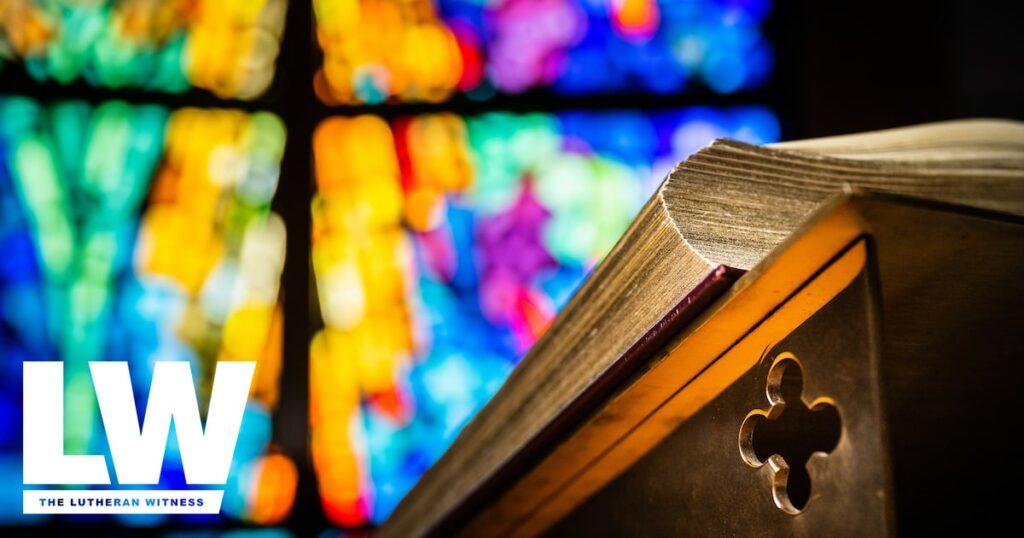by Matthew C. Harrison
Dear Friends and Fellow Workers in Christ!
The purpose of this “State of the Synod” issue of The Lutheran Witness is to provide accountability to you, the stakeholders of the Synod, regarding our stewardship of the mission given the national office. The following pages provide a wealth of information, emphasizing how the Synod continues to fulfill our seven mission priorities and our Synod’s triennial emphasis, “Making Disciples for Life.”
Before all of that, I would like to note our primary responsibility, that is, the proclamation of the sole and soul-saving Gospel of the free forgiveness of Christ, won by His life, death and resurrection. Every person in the Synod should be familiar with the heart of our confession of Christ and His sacred Scriptures. This is summarized in the Augsburg Confession, the most beautiful and significant words ever written (aside from the Scriptures):
|
Article IV: Justification. Our churches teach that people cannot be justified before God by their own strength, merits, or works. People are freely justified for Christ’s sake, through faith, when they believe that they are received into favor and that their sins are forgiven for Christ’s sake. By His death, Christ made satisfaction for our sins. God counts this faith for righteousness in His sight (Romans 3 and 4). |
This is the Gospel. This is why the church exists. This is why the LCMS exists. This is why we take great care in training pastors and church workers. This is why we have schools. This is why we have congregations. This is why we have a Synod structure of ecclesiastical supervision, on both the national and the district and circuit levels. This is why we hold each other accountable to the teaching of the Scriptures and the Lutheran Confessions. This is why we emphasize Law and Gospel. This is the content, focus and purpose of our preaching.
|
God’s favor is found only in Christ. “None is righteous, no, not one” (Rom. 3:10). The Law speaks to everyone. “Now we know that whatever the law says it speaks to those who are under the law, so that every mouth may be stopped, and the whole world may be held accountable to God. For by works of the law no human being will be justified in his sight, since through the law comes knowledge of sin” (Rom. 3:19–20). Eternal life — lock, stock and barrel, beginning to end — is a gift. “For there is no distinction: for all have sinned and fall short of the glory of God, and are justified by his grace as a gift, through the redemption that is in Christ Jesus, whom God put forward as a propitiation by his blood, to be received by faith. This was to show God’s righteousness, because in his divine forbearance he had passed over former sins” (Rom. 3:22–25). Justification depends on the promises of God in Christ Jesus. “That is why it depends on faith, in order that the promise may rest on grace and be guaranteed … No unbelief made him waver concerning the promise of God, but he grew strong in his faith as he gave glory to God, fully convinced that God was able to do what he had promised. That is why his faith was ‘counted to him as righteousness.’ But the words ‘it was counted to him’ were not written for his sake alone, but for ours also. It will be counted to us who believe in him who raised from the dead Jesus our Lord, who was delivered up for our trespasses and raised for our justification” (Rom. 4:16, 20–25). |
In the face of our many weaknesses and shortcomings, our challenges and difficulties — and in a time when many Lutheran churches have lost this central article in various ways, and when many church bodies have forgotten their reason for being — the LCMS, by God’s mercy alone, continues to believe, teach and confess this freeing Gospel of forgiveness, the soul remedy for hurting consciences. This Gospel is why we — all of us, pastors and laity — speak this message to our friends and neighbors, in all of our many and sundry vocations in life.
The Augsburg Confession follows the article on Justification with one that teaches how this Gospel is delivered to us every minute of every day, because we sinners need it:
|
Article V: The Ministry. So that we may obtain this faith, the ministry of teaching the Gospel and administering the Sacraments was instituted. Through the Word and Sacraments, as through instruments, the Holy Spirit is given [John 20:22]. He works faith, when and where it pleases God [John 3:8], in those who hear the good news that God justifies those who believe that they are received into grace for Christ’s sake. This happens not through our own merits, but for Christ’s sake. Our churches condemn the Anabaptists and others who think that through their own preparations and works the Holy Spirit comes to them without the external Word. |
And this blessed delivery of the Gospel of Christ makes believers and binds us together in the church, as Article VII notes so beautifully.
|
Article VII: The Church. Our churches teach that one holy Church is to remain forever. The Church is the congregation of saints [Psalm 149:1] in which the Gospel is purely taught and the Sacraments are correctly administered. For the true unity of the Church it is enough to agree about the doctrine of the Gospel and the administration of the Sacraments. It is not necessary that human traditions, that is, rites or ceremonies instituted by men, should be the same everywhere. As Paul says, “One Lord, one faith, one baptism, one God and Father of all” (Ephesians 4:5–6). |
Whatever vocations in the church and world we have, wherever we find ourselves in this world in these last days, whatever we say and do in our congregations, circuits, districts, schools and mercy organizations, whatever the Synod does on the national level — all must serve this Gospel, for the sake of the lost and the salvation of souls. “The Son of Man came to seek and to save the lost” (Luke 19:10).
-Pastor Harrison





